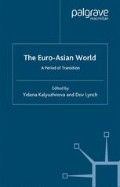Abstract
The Caspian Basin region, (see map 3.1), the name by which the Central Asian and the south Caucasus states are now coming commonly to be known, has served as a ‘hot spot’ for international oil industry discussion and exploration activities since 1991–92, when the states of the region became independent members of the international community. Oil industry interest in the area dates from somewhat before that time, from the mid-1980s when Soviet leader Mikhail Gorbachev first seriously raised the prospect of foreign investment to develop the vast unexploited Soviet oil reserves. Since large reserves lay outside of Russia, the collapse of the USSR made oil and gas rich states like Kazakhstan, Turkmenistan and Azerbaijan, of immediate interest.
Access this chapter
Tax calculation will be finalised at checkout
Purchases are for personal use only
Preview
Unable to display preview. Download preview PDF.
Notes
Manik Talwani and Andrei Belopolsky, ‘Geology and Petroleum Potential of the Caspian Sea Region’, Baker Institute Working Paper, April 1998.
Christopher Cooper and Hugh Pope, ‘Dry Wells Belie Hope for Big Caspian Reserves’, Wall Street Journal, 12 October 1998, p. A13.
Ronald Soligo and Amy Myers Jaffe, ‘The Economics of Pipeline Routes’, Baker Institute Working Paper, Rice University, Houston, TX, April 1998
Daniel Yergin, The Prize (New York: Touchstone/Simon & Schuster, 1991),
Isabel Gorst and Nina Poussenkova, ‘Petroleum Ambassadors of Russia: State Versus Corporate Policy in the Caspian Region’, Baker Institute Working Paper, April 1998.
Svante E. Cornell, ‘The Unruly Caucasus’, Current History, vol. 96, no. 612 (October 1997).
‘Albright says US is Willing to Make New Start with Iran; Offer Contingent on Improvements in Conduct’, Associated Press, 18 June 1998.
Authors’ interviews with National Iranian Oil Company (NIOC) officials, Central Asia, summer 1998.
Edmund Herzig, Iran and the Former Soviet South (London: Royal Institute of International Affairs, 1995).
Martha Brill Olcott, ‘The Caspian’s False Promise’, Foreign Policy, no. 111, Summer 1998, pp. 95–113.
Andrei Kortunov, ‘Russia and Central Asia: Evolution of Mutual Perceptions, Policies, Interdependence’, Baker Institute Working Paper, April 1998.
Institute for Strategic Studies, The Military Balance 1998/99 (Oxford: Oxford University Press, 1998).
Dan Morgan and David B. Ottaway, ‘Kazakh Field Stirs US–Russian Rivalry’, Washington Post, 6 October 1998, p. A1.
Editor information
Editors and Affiliations
Copyright information
© 2000 Palgrave Macmillan, a division of Macmillan Publishers Limited
About this chapter
Cite this chapter
Jaffe, A.M., Olcott, M.B. (2000). The Geopolitics of Caspian Energy. In: Kalyuzhnova, Y., Lynch, D. (eds) The Euro-Asian World. Euro-Asian Studies. Palgrave Macmillan, London. https://doi.org/10.1057/9780333981504_4
Download citation
DOI: https://doi.org/10.1057/9780333981504_4
Publisher Name: Palgrave Macmillan, London
Print ISBN: 978-1-349-41395-9
Online ISBN: 978-0-333-98150-4
eBook Packages: Palgrave Political & Intern. Studies CollectionPolitical Science and International Studies (R0)

